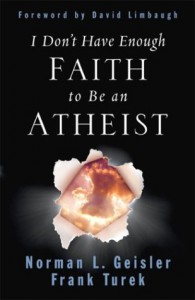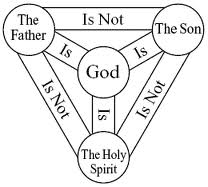Critiquing "I Don't Have Enough Faith to Be an Atheist" (Ch2, P3)
Author's Note: Read comment after post.
First, some housekeeping.
The question of whether I'd be able to keep up my posting schedule on this series during Christmas vacation finally resolved itself for me today, when I realized that no, I haven't a snowball's chance in Hell of keeping it on track. So be it known that a one-week hiatus herein begins, hopefully concluding with a new post on the 29th.
If you're Christian, think of this as one less atheist making war on Christmas.
And with that, let's wrap up Chapter 2 of I Don't Have Enough Faith to Be an Atheist.
WHEN LAST WE LEFT OUR HEROES...
As I mentioned when we began it, Drs. Geisler and Turek have devoted the bulk of Chapter 2 to simply explaining why logic and evidence are the best guides to one's beliefs. They don't really believe this, of course, but I do, so I'm not inclined to argue. There's also some stuff in this section about agnosticism, but we've already covered that while talking about Chapter 1.
Strictly speaking, then, it's unnecessary to talk about Chapter 2 at all, buuuuuuuuut Geisler and Turek happen to make within it a few by-the-side and implicit suggestions which, while lacking any real bearing on the authors' main 12-point argument, are so wrongheaded they demand objection. So I'm, y'know, objecting to them.
The last of these suggestions involves a short anecdote on pages 54-55 involving internationally-renowned Christian apologist Dr. Ravi Zacharias. A professor confronts Dr. Zacharias and tells him that:
"...you're using 'either-or' logic. In the East we don't use 'either-or' logic - that's Western. In the East we use 'both-and' logic. So salvation is not either through Christ or nothing else, but both Christ and other ways." (54)
As you might expect, Dr. Z coolly proceeds to show the professor the error of his ways, proving that
"despite what the relativists believe, things work in the East just like they work everywhere else. In India, just like in the United States, buses hurt when they hit you, 2+2=4, and the same gravity keeps everyone on the ground... Truth is truth no matter what country you come from." (55-56)
All simple, well, and good, you might say. But in taking time to refute "Eastern logic", I think Drs. Geisler and Turek are not only engaging in typical misrepresentation of their enemies' ideas, but also quietly denying an important fact about Christianity itself: that it is at root an Eastern religion, with an awful lot of so-called "Eastern logic" ingrained into it.
WESTERN LOGIC VS. "TRANSCENDENTAL NONCOGNITIVISM"
It's easy to understand why most of today's Christians don't think of their religion as "Eastern". Most of them are themselves born of the West, just for starters, and this has long been so. Today's politics (not to mention our increased knowledge of world geography) have also resulted in the modern land of Israel becoming an honorary member of "the West", much like Japan. And of course, Western ideas have had such an influence on Christianity's development from such an early stage that whatever the religion may have been at its beginning, it's probably only accurate to describe it as Western now.
Nevertheless, Christianity first sprang forth as a sect of Judaism, the religion of a people of the East, and consequently an awful lot of discussion in the early Christian church was devoted to trying to balance the Eastern-style theology of Christianity with the Western-style thinking of the people who ended up adopting it. In fact, one can trace the very origin of Christian apologetics to the need for early Christians to come up with responses to the questions and accusations of "Greeks" who found Christian concepts bizarrely illogical. One can also say that I Don't Have Enough Faith to Be an Atheist and this corresponding blog series are part of the continuation of that same conflict. Our debates are the latest rounds in a long fight between the traditions of Athens and Jerusalem that apologists like Geisler and Turek are determined to marry, just as were their predecessors Origen, Justin Martyr, et al.
To see the family resemblance between Christianity and its Eastern cousins today, however, we need to know what "Eastern" logic really is. Geisler and Turek typically provide only enough information to fashion a straw man they can easily bat aside, so let's look instead to a gentleman named James Quirk, who's written a pretty good summary about what he calls "transcendental noncognitivism". He writes:
A key theme of Eastern traditions, including Advaita Vedanta, Buddhism, and Taoism, is the idea that transcendental truth cannot be apprehended by the conceptual, logical, dualistic human mind...
Transcendental noncognitivism, then, is the recognition that the ultimate nature of reality, the Absolute, or "God" is fundamentally ineffable - beyond conceptual and logical comprehension. This conclusion itself, however, is not illogical - on the contrary, it is generally the culmination of an intensive logical process which brings logic and conceptual thought to the very limit of their applicability. To discover the trans-logical, trans-rational nature of reality is itself a logical and rational outcome. Under this approach, it is logic which leads to faith, rather than away from it, as it often does in the West. Far from being some strange process of magical thinking and incomprehensible occurrences as is often imagined by both Western critics and New Age adherents, the mystical process is in fact a deeply logical and rational one - at least until the very moment when logic and rationality must finally be transcended out of sheer necessity.
Am I the only one who sees a similarity between the above explanation and a number of things Christians say when they inexorably arrive at the limits of their ability to describe God and other divine concepts? I even recall our own webmaster Joe once pontificating: "If we could understand everything He did, would he be God?"
EXEMPLI GRATIA
No good? Maybe we need an example. Let's talk about a core tenet of Christianity that is clearly contradictory in the same way as a number of "Eastern" religious ideas.
Frustrated by his perception I don't understand the laws of logic, my reader Steve recently started listing the various laws in a comment. One of the laws he mentioned is the Law of Identity. To let him put it:
A is A and not non-A
Cat (A) is Cat and not non-cat (non-A)
Is this true or is this false? is a cat a pickle? is a cat a dog? is a cat a sandwiche? or is a cat a cat? This is the law of identity.
A neat and tidy summary, I think. In light of this Law of Identity, however, what are we to make of the person of Jesus Christ?
Because I am pretty much certain that Steve, being a Christian, believes Jesus Christ was both fully man and fully God - an idea theologians refer to as the Hypostatic Union. I can be sure of this because the concept is very mainstream: as much as Catholic, Protestant, and Orthodox Christians disagree with each other, they'll all nod their heads if you mention Jesus was and is simultaneously human and divine. And be sure to note: "Jesus' two natures are not 'mixed together,' nor are they combined into a new God-man nature" (CARM). Neither is He a spiritual schizophrenic, a man possessed by God as some are said to be possessed by demons. No: Jesus possesses two natures commonly described as being "attached" to each other, yet He is the Word of God become flesh, which suggests transformation. In short, He's 100% God, but He's also just a guy.
There are no meaningful answers to the questions that raises. The folks over at CARM (Christian Apologetics Research Ministries) have tried to help us understand by including a table in their own article on the Hypostatic Union that's meant to "help you see the two natures of Jesus 'in action'", but all it clarifies is the incoherency of the concept. Jesus knew everything (John 21:27) yet grew wiser as He became older (Luke 2:52)? The "fullness of the deity dwells in Him" (Colossians 2:9) but "He has a body of flesh and bones" (Luke 24:39)? It makes no sense, even after you've made all the distinctions between "natures" and "Persons" and "senses" and "essences" the apologists ask you to.
It's only fair to note Geisler and Turek don't agree. However, it's also fair to note that when they briefly discuss Jesus' two natures in I Don't Have Enough Faith to Be an Atheist (in Chapter 13, and here let me apologize for getting ahead of the book; I'll try not to do it again), they don't provide any half-decent explanation either.
Know what, though? Many Christians I know are OK with that, just like they're OK being monotheists worshiping a Trinity. There's even an alternative term some of them use for the Hypostatic Union which gets across the incomprehensibility of their belief: "the mystical union".
A term of which I suspect their Taoist cousins in religion would approve.
A LAST QUESTION
To recap, Messrs. Geisler and Turek take a few pages in this chapter to explain why "Eastern logic" doesn't work, so it can't be used as an excuse not to accept the "Western logic" they mean to deploy in favor of Christianity. However, they have either forgotten or wrongly believe Christianity doesn't depend on a little "Eastern logic" of its own. The point at which "Eastern logic" becomes necessary is beyond the scope of their book, however, so this problem doesn't derail our discussion of it.
It does, however, leave me a wee bit curious.
Here's why:
With I Don't Have Enough Faith to Be an Atheist, Geisler and Turek hope to prove the Bible is true by using only logic and evidence. If they can do that, of course, they don't just win a debate over the doctrine of Biblical inerrancy; by default, they also win every other debate against Christianity, so long as the relevant points are easily identifiable within the Good Book. Right? Right. After all, if they've proven the Bible is true, they don't have to prove God is good; they just have to show where the Bible says God is good.
Yet some Biblical doctrine, like the Hypostatic Union, is clearly illogical - or "transcendentally noncognitive", don't you know. So, is their plan simply to say of such things, "Well, we proved the Bible is true. So even though this doctrine is illogical, you have to believe it because we've logically proven the Bible is true?"
In other words, are Geisler and Turek hoping to use "Western logic" to prove the "Eastern logic" of their doctrine? It certainly seems like it.
Surely that creates an impassable loop of contradiction, though. The Bible cannot logically be true if it contains illogical ideas.
Which happens to be exactly the contradiction that Christian apologists like Dr. Zacharias like to throw in the faces of "Eastern logicians".
As Drs. Geisler and Turek write on page 56:
People will try to tell you that logic doesn't apply to reality, or logic doesn't apply to God, or there are different types of logic, and so on. But as they say such things, they use the very logic they are denying. This is like using the laws of arithmetic to prove that arithmetic cannot be trusted."
Well said.
NEXT: We start Chapter 3 on the 29th.

